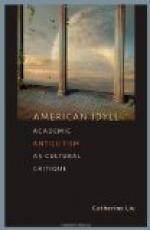And the feeling of the courting days never left us—that almost sharp joy of being together again when we just locked arms for a block and said almost nothing—nothing to repeat. And the good-bye that always meant a wrench, always, though it might mean being together within a few hours. And always the waving from the one on the back of the car to the one standing on the corner. Nothing, nothing, ever got tame. After ten years, if Carl ever found himself a little early to catch the train for Tacoma, say, though he had said good-bye but a half an hour before and was to be back that evening, he would find a telephone-booth and ring up to say, perhaps, that he was glad he had married me! Mrs. Willard once said that after hearing Carl or me talk to the other over the telephone, it made other husbands and wives when they telephoned sound as if they must be contemplating divorce. But telephoning was an event: it was a little extra present from Providence, as it were.
And I think of two times when we met accidentally on the street in Seattle—it seemed something we could hardly believe: all the world—the war, commerce, industry—stopped while we tried to realize what had happened.
Then, every night that he had to be out,—and he had to be out night after night in Seattle,—I would hear his footstep coming down the street; it would wake me, though he wore rubber heels. He would fix the catch on the front-door lock, then come upstairs, calling out softly, “You awake?” He always knew I was. Then, sitting on the edge of the bed, he would tell all the happenings since I had seen him last. Once in a while he’d sigh and say, “A little ranch up on the Clearwater would go pretty well about now, wouldn’t it, my girl?” And I would sigh, and say, “Oh dear, wouldn’t it?”
I remember once, when we were first married, he got home one afternoon before I did. When I opened the door to our little Seattle apartment, there he was, walking the floor, looking as if the bottom had dropped out of the universe. “I’ve had the most awful twenty minutes,” he informed me, “simply terrible. Promise me absolutely that never, never will you let me get home before you do. To expect to find you home and then open the door into empty rooms—oh, I never lived through such a twenty minutes!” We had a lark’s whistle that we had used since before our engaged days. Carl would whistle it under my window at the Theta house in college, and I would run down and out the side door, to the utter disgust of my well-bred “sisters,” who arranged to make cutting remarks at the table about it in the hope that I would reform my “servant-girl tactics.” That whistle was whistled through those early Seattle days, through Oakland, through Cambridge, Leipzig, Berlin, Heidelberg, Munich, Swanage, Berkeley, Alamo in the country, Berkeley again (he would start it way down the hill so I could surely hear), Castle Crags, and Seattle. Wherever any of us were in the house, it meant a dash for all to the front door—to welcome the Dad home.




